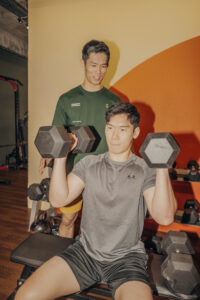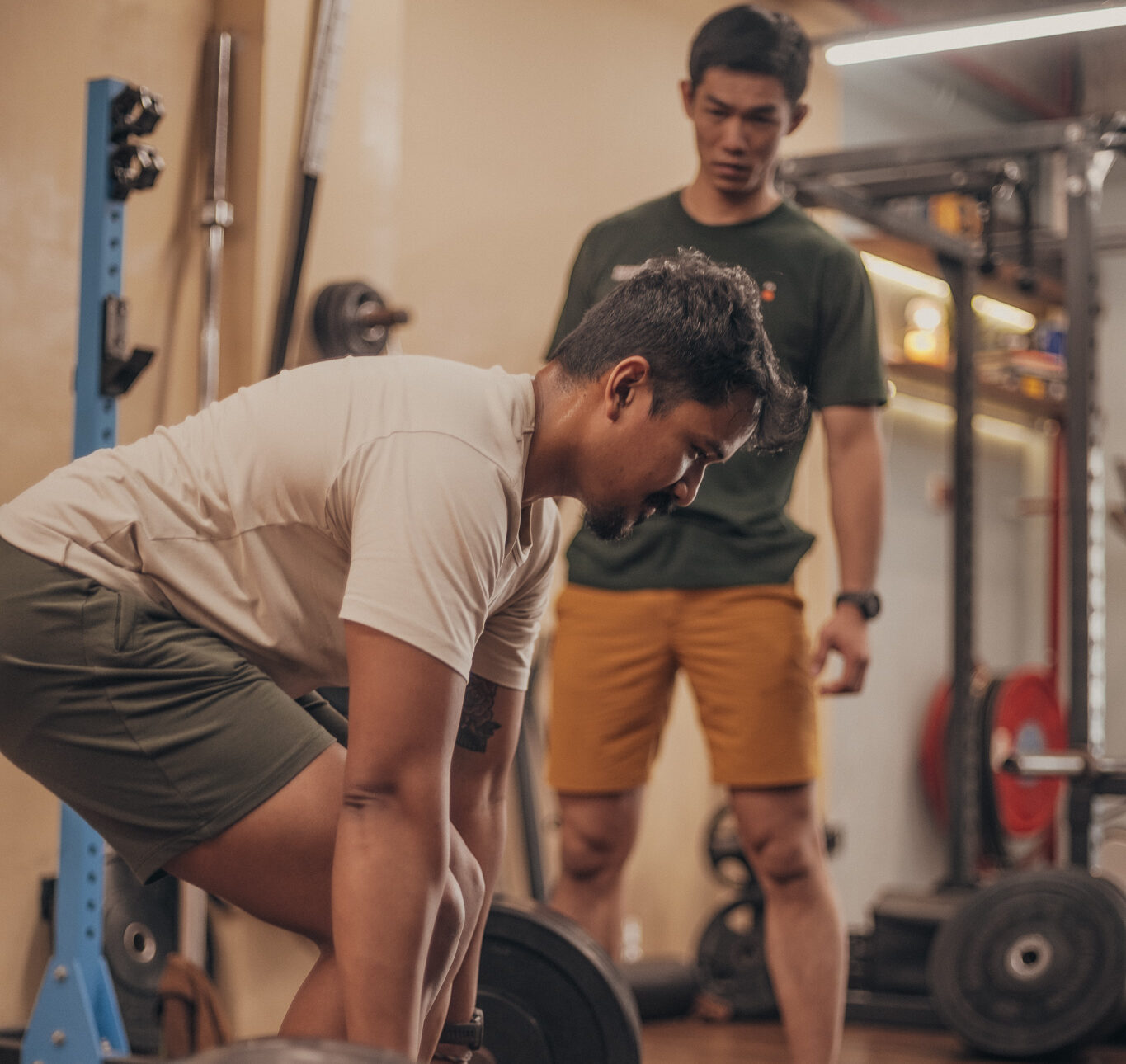Gene Leong, MSc in Applied Sport & Exercise Psychology student and Co-Founder of Field Assembly in Singapore, discusses his background, journey into coaching and business and how he sees sports psychology complementing these.
Having initially pursued martial arts to maintain his fitness, this unexpectedly led to active competition for Gene. This experience sparked an interest in strength and conditioning to further enhance performance levels.
“I was fortunate to find a mentor in a personal trainer whose guidance was invaluable. His support not only deepened my knowledge but also provided me with the opportunity to manage my own gym, marking the start of my professional journey in the fitness industry.”, Gene outlines.
Journey into Fitness and Coaching
Gene’s experience in this area led to the creation of Field Assembly, providing personal training, strength and conditioning classes, Brazilian Jiu-Jitsu classes for both adults and kids, as well as Muaythai classes.
“Field Assembly was founded during a period of rapid growth in Singapore’s fitness industry, at a time when we recognised a unique opportunity to shape how people engaged with fitness and sports. My business partner and I shared a distinct vision for a new kind of fitness culture—one that wasn’t confined to the walls of a gym but extended into diverse activities and everyday adventures, from snowboarding to hiking to active daily living. We didn’t want just another gym; we aimed to cultivate a community where fitness supports personal and adventurous pursuits. Our approach to combat sports like Brazilian Jiu Jitsu and Muay Thai centers on learning and personal development rather than just competition. We believe these disciplines are powerful ways to see physical fitness manifest in skills that extend beyond typical gym activities.”, he shares.
Gene holds various roles and responsibilities as Managing Director at Field Assembly.
“I spend most of my working time coaching—both in one-on-one personal training sessions with adults and teaching Jiu Jitsu to kids and teens aged 6-14. My responsibilities extend to managing our staff. I conduct monthly one-on-one meetings with each coach to ensure alignment with our company values, discuss performance, job satisfaction, and address any issues they might be facing. We hold weekly team meetings to troubleshoot, discuss client concerns, check on operations, and reinforce our mission.”
Coaching Philosophy
Outlining his approach to coaching, Gene identifies three key points:
“1) Balanced: Doing this profession well means being able to reconcile opposing viewpoints and contradictions, while finding a practical solution.
2) Openness: In a scientific field that involves helping people, having an open mind will be important so I can keep up with findings that evolve through time and cater to individuals with different needs that may require less conventional support.
3) Conscientiousness: The multitude of responsibilities for this job (maintaining records, being transparent and forthright, putting clients first, protecting the profession etc.) will mean that the practitioner has to be conscientious to fulfill these duties.”
Applying Sports Psychology Learnings
He also outlines how he feels his studies in sports psychology have impacted his coaching practice.
“Learning about sports psychology has profoundly impacted my approach. It has shaped how I research, discuss, and integrate new knowledge into my practice.
Some significant impacts have been:
1) Avoiding a dogmatic approach to any single method.
2) It’s taught me the importance of recognizing the limits of my knowledge and
3) Maintaining a person-centered focus in my coaching.
This awareness helps me adapt my methods to meet the unique needs of each individual, fostering a more effective and supportive environment for growth and development.”
His studies have also helped to enhance to client experience in Field Assembly, “particularly through improved engagement with parents in our youth sports programmes”, Gene shares.
 “I’ve applied research insights to foster empathy, patience, and guidance, helping parents navigate their roles more effectively. By incorporating them into the system rather than sidelining them, we’ve seen a significant positive impact. This approach has led to excellent feedback from parents, who appreciate being part of a supportive community that enhances their children’s sports experience.”
“I’ve applied research insights to foster empathy, patience, and guidance, helping parents navigate their roles more effectively. By incorporating them into the system rather than sidelining them, we’ve seen a significant positive impact. This approach has led to excellent feedback from parents, who appreciate being part of a supportive community that enhances their children’s sports experience.”
“I find myself deeply interested in how the mind works, and I believe this interest comes from both the relevance the field has to my job and sport, and my inclination to learn new things.
Over the course of the past decade, I have become a business owner, a personal trainer, and a Brazilian Jiu Jitsu coach for kids. A major aspect of my job is people management. This involves managing, aligning, and mentoring staff; understanding customer behaviours and applying that to business development; coaching individuals beyond the technical aspects of exercise to cultivate good habits and routines; and connecting and engaging with adolescent athletes while forming working relationships with their parents.
The role that psychology has to play in me delivering my job well becomes more apparent to me every day. Some of my clients have told me that our training sessions have been a cornerstone of their mental well-being, and that means a lot to me. Because of this, my interest in psychology has been growing, and I also feel it is my responsibility to gain better knowledge in this area.”
A strong support network
Gene outlines how a strong support system has been fundamental in his career to date.
“Having a strong support system has been a fundamental factor in all my achievements. This includes mentors who believed in my potential, friends who believed in my vision and joined my team, and a supportive life-partner and parents who provided me the space and time to grow my business without the pressure of immediate financial success. I realize this level of support is a privilege that not everyone has, which makes me cautious about suggesting others take the same path I did. However, for those starting their own fitness brand or gym, I believe cultivating a reliable support network can be incredibly beneficial, even crucial, for enduring the inevitable ups and downs of entrepreneurship.”
Learn more about the MSc in Applied Sport & Exercise Psychology here.


Leave A Comment